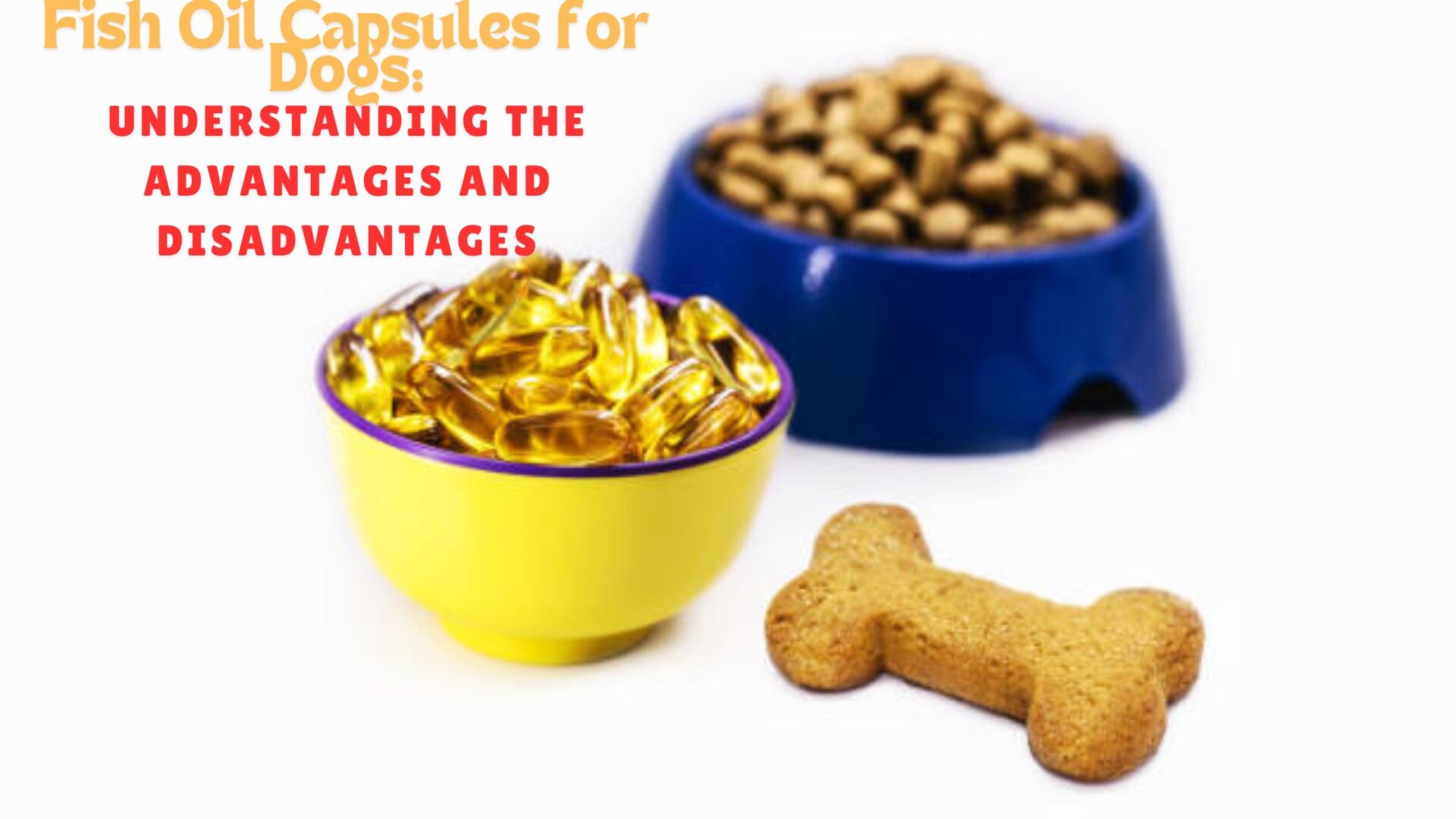Introduction:-
Fish Oil Capsules for Dogs: Understanding the Advantages and Disadvantages

In the realm of canine supplements, fish oil capsules have gained immense popularity, celebrated for their myriad health benefits. Yet, as with any supplement, they carry potential drawbacks. This article aims to delve into the advantages and disadvantages of incorporating fish oil capsules into your furry companion’s diet, empowering you to make an informed decision that prioritizes their well-being.
Advantages of Fish Oil Capsules for Canine Health
- Enhanced Coat and Skin Health
- Fish oil’s abundant omega-3 fatty acids contribute to a shiny coat and improved overall skin health in dogs.
- Omega-3 fatty acids alleviate itching and inflammation caused by allergies and skin conditions, providing relief and comfort.
- Improved Joint Health
- Fish oil reduces inflammation in joints, offering significant relief for dogs with arthritis and other joint issues.
- Regular supplementation can lead to enhanced mobility and increased comfort, especially for senior dogs.
- Strengthened Immune System
- Omega-3 fatty acids in fish oil bolster the immune system, making dogs less susceptible to infections and illnesses.
- Fish oil promotes cardiovascular health, reducing the risk of heart disease and supporting overall heart function.
- Cognitive Enhancement
- Fish oil contains DHA, an essential omega-3 fatty acid that plays a vital role in brain health. DHA supports cognitive function and may slow cognitive decline in aging dogs.
- Studies suggest that fish oil can positively influence behavior and enhance learning abilities in dogs.
Disadvantages of Fish Oil Capsules for Dogs
- Stomach related Issues
- Steamed Stomach: A few canines might encounter stomach upset, including loose bowels and spewing, when initially acquainted with fish oil.
- Terrible Breath: Fish oil can here and there cause awful breath in canines.
- Potential Excess
- An overdose of something that is otherwise good: Ingesting too much fish oil can prompt unfavorable impacts, for example, blood coagulating issues and lack of vitamin E. Continuously follow the suggested measurement.
- Quality Worries
- Foreign substances: Bad quality fish oil enhancements might contain toxins like mercury and other weighty metals. Picking top caliber, trustworthy brands is urgent.
- Oxidation: Fish oil can oxidize and become foul, which can be hurtful. Appropriate capacity and checking lapse dates are fundamental.
- Unfavorably susceptible Responses
- Fish Sensitivities: A few canines might have sensitivity to fish or fish oil, prompting hypersensitive responses like tingling, hives, or enlarging.
How to Safely Introduce Fish Oil Capsules to Your Dog?
Instructions to Securely Acquaint Fish Oil Containers with Your Canine

Counsel Your Veterinarian
Prior to beginning any new enhancement, it’s fundamental to talk with your veterinarian. They can give direction on the suitable dose and screen your canine’s wellbeing.
Begin Gradually
Step by step acquaint fish oil with your canine’s eating regimen to limit the gamble of stomach related issues. Begin with a lower portion and bit by bit increment it after some time.
Pick Excellent Enhancements
Decide on fish oil containers from respectable brands that utilization superior grade, foreign substance free fish oil. Search for items that have been freely tried for virtue.
Screen Your Canine
Watch out for your canine for any unfriendly responses or changes in conduct. Assuming that you notice any issues, stop use and counsel your veterinarian.
Can fish oil cause diarrhea in dogs?
Yes, fish oil can cause diarrhea in dogs. While fish oil is often given to dogs to provide essential omega-3 fatty acids, which can benefit their coat, skin, and overall health, it can also cause digestive issues in some dogs. Common side effects of fish oil supplementation in dogs include diarrhea, loose stools, and an upset stomach.
If you are considering adding fish oil to your dog’s diet, it is important to:
- Start with a low dose: Gradually increase the amount to allow your dog’s digestive system to adjust.
- Choose high-quality fish oil: Poor-quality fish oil or those with additives can increase the risk of digestive upset.
- Consult your veterinarian: Before starting any supplement, it’s best to consult with your vet to ensure it’s appropriate for your dog and to determine the correct dosage.
If diarrhea persists after starting fish oil, it may be best to stop the supplement and consult your vet for alternative options.
How much fish oil should I give my dog?
The appropriate amount of fish oil for your dog depends on their weight and specific health needs. However, general guidelines for dosage based on weight are often provided. It’s always best to consult your veterinarian for precise recommendations tailored to your dog’s health. Here are some general guidelines:

- Small dogs (up to 20 lbs):
- 100-200 mg of EPA/DHA per day
- Medium dogs (21-49 lbs):
- 200-500 mg of EPA/DHA per day
- Large dogs (50-79 lbs):
- 500-1,000 mg of EPA/DHA per day
- Giant dogs (80+ lbs):
- 1,000-1,500 mg of EPA/DHA per day
These dosages are for combined EPA and DHA, the active omega-3 fatty acids in fish oil. When using fish oil capsules or liquid, check the label to determine how much EPA and DHA is in each dose.
Tips for Supplementing Fish Oil:
- Start Slowly: Introduce fish oil gradually to your dog’s diet to avoid digestive upset.
- Split the Dose: If giving a larger dose, consider splitting it into two smaller doses given at different times of the day.
- Monitor Your Dog: Watch for any adverse reactions like diarrhea or vomiting and adjust the dosage as necessary.
Always check with your veterinarian before starting any new supplement to ensure it is safe and appropriate for your dog’s specific health needs.
Is fish oil good for dogs every day?
Yes, fish oil can be beneficial for dogs when given daily, as long as it is done in the correct dosage and under the guidance of a veterinarian. The omega-3 fatty acids in fish oil, specifically EPA (eicosapentaenoic acid) and DHA (docosahexaenoic acid), offer several health benefits for dogs:
Benefits of Daily Fish Oil for Dogs:
- Improves Skin and Coat Health:
- Reduces itching and flakiness
- Promotes a shiny, healthy coat
- Supports Joint Health:
- Reduces inflammation in conditions like arthritis
- Improves mobility and comfort
- Enhances Heart Health:
- Supports cardiovascular function
- Helps manage cholesterol levels
- Boosts Immune System:
- Enhances the body’s natural defenses against illnesses
- Supports Cognitive Function:
- Beneficial for puppies’ brain development
- Helps maintain cognitive function in older dogs
Considerations for Daily Use:
- Correct Dosage:
- Follow the dosage recommendations based on your dog’s weight and specific needs.
- Over-supplementation can lead to adverse effects like diarrhea, vomiting, or altered blood clotting.
- Quality of Fish Oil:
- Choose high-quality fish oil specifically formulated for dogs.
- Avoid fish oil with added flavors or preservatives that may not be safe for dogs.
- Consult Your Veterinarian:
- Always discuss with your vet before starting any new supplement.
- Your vet can provide guidance on the appropriate dosage and monitor your dog for any potential side effects.
- Monitor for Side Effects:
- Watch for signs of digestive upset, such as diarrhea or vomiting.
- If side effects occur, adjust the dosage or discontinue use and consult your vet.
When given in the right amounts and with proper veterinary guidance, daily fish oil can be a valuable supplement for your dog’s overall health and well-being.
Conclusion
Fish oil capsules can offer numerous health benefits for dogs, from improved coat and skin health to enhanced joint function and cognitive support. However, it’s essential to be aware of potential disadvantages, including digestive issues, quality concerns, and the risk of overdose. By consulting with your veterinarian and choosing high-quality supplements, you can safely introduce fish oil capsules to your dog’s diet and help them enjoy a healthier, happier life.
References
- American Kennel Club – Fish Oil for Dogs
- PetMD – Fish Oil for Dogs: Benefits and Side Effects
- VCA Hospitals – Omega-3 Fatty Acids: Benefits for Pets
- ASPCA – Omega-3 Fatty Acids and Dogs








